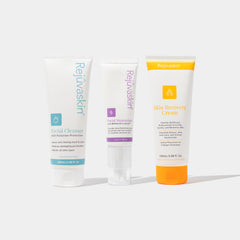Managing eczema can be challenging, but with the right approach, you can reduce flare-ups and improve your skin's overall health. At Rejuvaskin, we're passionate about helping you care for your skin with science-backed, physician-trusted products. Below are eight actionable tips to help manage your eczema while promoting healthier, more resilient skin.
1. Moisturize Regularly
Keeping your skin well-hydrated is crucial for preventing eczema outbreaks. Moisturizers help reinforce the skin barrier, reducing the risk of flare-ups caused by dryness. Using a thick, fragrance-free cream like Rejuvaskin Skin Recovery Cream can help lock in moisture. Apply it after bathing when your skin is still damp to maximize hydration (Cleveland Clinic, 2023).
Pro Tip: Studies have shown that moisturizing within three minutes of bathing can significantly reduce eczema flare-ups (Mayo Clinic, 2023).
2. Know and Avoid Your Triggers
Everyone’s eczema is different, and understanding your triggers is key. Common triggers include certain fabrics (like wool or polyester), environmental factors (such as pollen or smoke), and even stress. Choose gentle, breathable fabrics to reduce flare-ups.
Actionable Step: Track your triggers in a journal to better understand what causes flare-ups, so you can avoid or minimize them in the future.
3. Enhance Your Bathing Routine
Hot water can strip your skin of its natural oils, exacerbating eczema. Stick to warm showers and avoid harsh soaps. Pat your skin dry rather than rubbing, and immediately follow up with a moisturizer like Rejûvaskin's Skin Recovery Cream which restores and protects the skin’s barrier (Verywell Health, 2023).
Tip: Keep showers short (5-10 minutes) and use a humidifier to combat dry air, which can aggravate eczema.
4. Wear Eczema-Safe Clothing
Clothing choices can make a big difference in managing eczema. Look for eczema-friendly fabrics such as cotton, silk, or bamboo, which are gentle on sensitive skin. These materials are soft, breathable, and less likely to irritate the skin, helping to reduce discomfort for eczema-prone individuals. Loose-fitting clothing is also recommended to minimize friction and sweating, which can trigger flare-ups (National Eczema Association, 2023).
5. Stay Hydrated
Hydration is not only important externally but also internally. Drinking enough water throughout the day keeps your skin hydrated from within, supporting overall skin health. Along with moisturizing, proper hydration helps prevent dryness, a major trigger for eczema (Healthline, 2023).
Tip: Make it a habit to drink at least 8 glasses of water daily and consider a water-rich diet with fruits and vegetables to support hydration.
6. Manage Stress
Stress is a known trigger for eczema flare-ups. Incorporating stress-reduction techniques like yoga, meditation, or deep breathing exercises into your daily routine can help. Research shows that stress increases cortisol levels, which can lead to inflammation and worsen eczema symptoms (National Eczema Association, 2023).
Try This: Regular mindfulness practices, such as progressive muscle relaxation or guided imagery, can have a positive impact on eczema management.
7. Avoid Harsh Chemicals and Fragrances
Many skincare and household products contain chemicals that can irritate eczema-prone skin. Opt for fragrance-free and dye-free products like the Rejuvaskin Skin Recovery Cream, which soothes and repairs damaged skin barriers without introducing irritants (Cleveland Clinic, 2023).
8. Seek Professional Guidance
If over-the-counter treatments aren’t enough, consult a dermatologist. Prescription treatments like topical corticosteroids or newer non-steroidal anti-inflammatory creams can provide relief. For more persistent cases, therapies such as phototherapy or biologic medications may be recommended (Healthline, 2023).
Why Choose Rejuvaskin for Eczema-Prone Skin?
Rejuvaskin offers a range of products, like the Skin Recovery Cream, designed to support skin health. Our products focus on hydration and skin barrier restoration, which are key in preventing flare-ups. Trusted by physicians and dermatologists, our formulations are safe for daily use on sensitive skin.
The Final Word
Eczema can be a challenging condition to manage, but with the right approach and products, you can reduce flare-ups and improve your skin's resilience. Remember to keep your skin moisturized, avoid triggers, and seek professional help when needed. By following these tips and incorporating Rejuvaskin’s scientifically backed skincare solutions, you’ll be well on your way to healthier, happier skin.
Works Cited
- Cleveland Clinic. (2023). Eczema Flare-Ups Causes and How to Prevent Them. Retrieved from Cleveland Clinic
- Mayo Clinic. (2023). Atopic Dermatitis (Eczema) - Diagnosis and Treatment. Retrieved from Mayo Clinic
- National Eczema Association. (2023). 20 Lifestyle and Health Hacks for Controlling Eczema. Retrieved from National Eczema Association
- Verywell Health. (2023). Preventing Flares and Eczema Spread. Retrieved from Verywell Health





















Leave a comment